Are you considering ceramic or porcelain tiles for your new home?
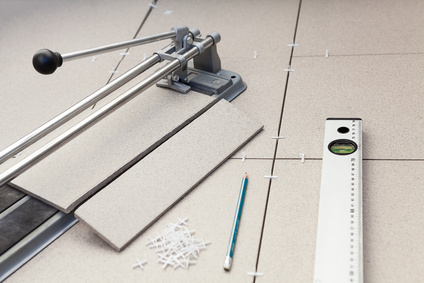
‘Ceramic tile’ has become a generic term that applies to a wide range of tiles made from fired clay.
While the term is generic, there are differences in the products that fall under it which can have an impact on the cost, appearance and hardiness of the tile you end up using in your custom new home.
The two most common types of tiles used in new homes are ceramic and porcelain. While they share a lot of similarities in construction and performance, there are some subtle differences that we will explore here.
Ceramic V Porcelain tiles – key differences
Ceramic Tiles
Ceramic tiles are made with a red, brown or white clay that is softer, less dense and fired at a lower temperature. They are usually glazed in a solid colour, with a wider variety of shapes and sizes available due to the less complex construction process. These tiles are easy to cut and shape, and usually easier to lay due to the shape of the edge of the tile. Glazed ceramic tiles are stain and scratch resistant, hard wearing and easy to clean and maintain. While ceramic tiles are more porous than porcelain, they still provide a good level of water proofing and can be used in wet areas. Even though they are heard wearing, ceramic tiles are still susceptible to chipping and cracking, particularly in high traffic areas. Overall, ceramic tiles are a cost efficient option that will still deliver great functional and aesthetic benefits.
Porcelain tiles
Porcelain tiles are made with a combination of white clay, sand and feldspar and fired at a higher temperature than traditional ceramic. The construction process makes them a harder and denser tile that is much more difficult to cut and shape when installing. It also means that you’re getting a tile that is more hard-wearing and resistant to scratches, chips and cracks.
Because they are naturally dense, porcelain tiles are less porous which makes them stain resistant, suitable for use in wet areas and easy to clean and maintain. While it is possible to finish porcelain tiles in solid colours, recent innovations have made it possible to manufacture them to resemble different finishes, like natural stone, which has made them a popular option for custom new homes. Overall, porcelain tiles are the more expensive option due to the complexity of manufacturing and installation processes, but which also sees them deliver superior functional benefits and more prestige, luxurious aesthetic options.
At a glance comparison:
Durability: Porcelain
Appearance: Porcelain
Water resistance: Porcelain
Care: Both
Installation: Ceramic
Cost: Ceramic
Lifespan: Both
When it comes to the overall finish and style of your tiled surface, there is one more important consideration – how the edge of your tiles are finished. Rectified and unrectified finishes will produce vastly different end results in terms of look and feel, so we have provided you with a quick overview so that you can select the best finish to compliment the style of your custom new home.
Rectified V Unrectified (Cushion) Edge
Rectified edge tiles
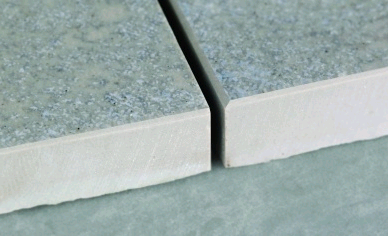
Rectified tiles have been precisely machine finished to exact dimensions, giving them near-perfect straight edges finished with a very fine bevel around their top edge to help reduce the chance of their sharp edges chipping. These tiles allow for clean, symmetrical laying, with minimal gap in between to give an almost seamless look. They provide a crisper, more modern finish in a new home. All porcelain tiles are finished with a rectified edge.
Unrectified (cushion) edge tiles
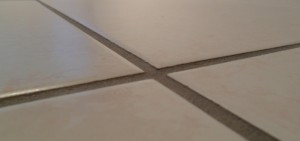
An unrectified edge, also referred to as a cushion edge, is rounded and softer finish. This makes the tile much simpler to lay and has a wider grout line, giving you the option to use your grout in a more decorative application. These tiles will leave you with a more traditional tiled finish. Ceramic tiles can be finished with either a cushion or rectified edge.
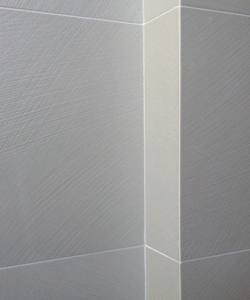
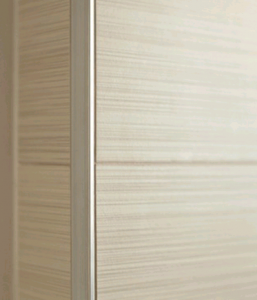
Tile size
Larger tiles are becoming more popular in custom new homes for their ability to deliver cleaner, more minimalist finishes. As a standard, we recommend 300mm x 600mm tiles in our custom new homes, but also commonly see tiles as large as 600mm x 600mm, 450mm x 900mm, and 1200mm x 600mm used on floors, and in floor-to-ceiling applications.
One thing to be mindful of is that as your tile get bigger, so may your installation cost, with the larger tiles potentially costing up to 30% more to lay per m2.
But wait, there’s more…
We have explored the two most common types of tiles in this article, but there are a number of other options available that can deliver more bespoke finishes to custom homes. These include natural stones such as travertine, bluestone, terrazzo and slate. We will explore these options in more detail in a further article.
Are you ready to explore the variety of finishes you can achieve with tiled floors in your custom new home? The Renmark Homes team have been helping clients like you select the best flooring options for their prestige custom homes for over 30 years.
Arrange a time to chat to the Renmark Homes team to customise your flooring solution today.
